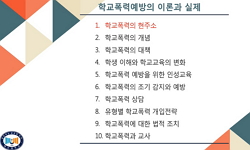The purpose of this research is to figure out the effect of care promotion programs on self-esteem, aggressiveness, and peer relationship of school violence bullies. The following hypotheses were established: First, the self-esteem score of the ...
http://chineseinput.net/에서 pinyin(병음)방식으로 중국어를 변환할 수 있습니다.
변환된 중국어를 복사하여 사용하시면 됩니다.
- 中文 을 입력하시려면 zhongwen을 입력하시고 space를누르시면됩니다.
- 北京 을 입력하시려면 beijing을 입력하시고 space를 누르시면 됩니다.
배려증진 프로그램이 학교폭력 가해아동의 자아존중감, 공격성 및 또래관계에 미치는 효과 = Effect of care promotion programs on self-esteem, aggressiveness, and peer relationship of school violence bullies
한글로보기https://www.riss.kr/link?id=T13258955
- 저자
-
발행사항
부산 : 경성대학교 교육대학원, 2013
-
학위논문사항
학위논문(석사) -- 경성대학교 교육대학원 , 상담심리전공 , 2013
-
발행연도
2013
-
작성언어
한국어
- 주제어
-
KDC
370.1804 판사항(4)
-
발행국(도시)
부산
-
형태사항
iv,113p. ; 26cm
-
일반주기명
참고문헌: p.66-75
- 소장기관
-
0
상세조회 -
0
다운로드
부가정보
다국어 초록 (Multilingual Abstract)
The following hypotheses were established:
First, the self-esteem score of the experiment group participants in care promotion programs may be significantly higher than that of the control group. Second, the aggressiveness score of the experiment group participants in care promotion programs may be significantly lower than that of the control group. Thirdly, the peer relationship score of the experiment group participants in care promotion programs may be significantly higher than that of the control group.
To prove these hypotheses, after SSRS for teachers was applied to from the grade 4 to 6 of 'S' Elementary School in 'U' city, the teachers were asked to recommend 24 boys that showed very serious aggressiveness among more than 30% student on a higher rank with from 25 to 36 of problematic behavior score. The total 22 children who agreed to join this research were chosen as the subjects of this study and they were divided into 11 as the experiment and the control group respectively.
Both the pre and the post tests about self-esteem, aggressiveness, and peer relationship tests for the experiment and the control group were conducted in order to prove the effect of care promotion programs. The mean and the standard deviation were sought after according to each scale by exploiting SPSS/WIN+19.0 statistical programs. The pre test scores for each group were established as covariate and ANCOVA to the post test scores for them was conducted to examine the difference between those two groups.
The findings of this study are the following:
First, he self-esteem score of the experiment group participants in care promotion programs increased than that of the control group.
Second, the aggressiveness score of the experiment group participants in care promotion programs decreased than that of the control group.
Third, the peer relationship score of the experiment group participants in care promotion programs increased than that of the control group.
In the light of these findings, it is proved that care promotion programs gives positive effect on the decrease of aggression and the enhancement of self-esteem and peer relationship of school violence bullies. It is feasible to assume that care promotion programs can make school violence bullies regulate themselves in school life and daily life and encourage them to access problems confidently. Furthermore, care promotion programs can allow those bullies to cope with problems together with neighborhood and to develop the adaptability of giving respect to others' opinions.
Finally, based on the finding, limitations of current study and the suggestions for further research were offered.
The purpose of this research is to figure out the effect of care promotion programs on self-esteem, aggressiveness, and peer relationship of school violence bullies.
The following hypotheses were established:
First, the self-esteem score of the experiment group participants in care promotion programs may be significantly higher than that of the control group. Second, the aggressiveness score of the experiment group participants in care promotion programs may be significantly lower than that of the control group. Thirdly, the peer relationship score of the experiment group participants in care promotion programs may be significantly higher than that of the control group.
To prove these hypotheses, after SSRS for teachers was applied to from the grade 4 to 6 of 'S' Elementary School in 'U' city, the teachers were asked to recommend 24 boys that showed very serious aggressiveness among more than 30% student on a higher rank with from 25 to 36 of problematic behavior score. The total 22 children who agreed to join this research were chosen as the subjects of this study and they were divided into 11 as the experiment and the control group respectively.
Both the pre and the post tests about self-esteem, aggressiveness, and peer relationship tests for the experiment and the control group were conducted in order to prove the effect of care promotion programs. The mean and the standard deviation were sought after according to each scale by exploiting SPSS/WIN+19.0 statistical programs. The pre test scores for each group were established as covariate and ANCOVA to the post test scores for them was conducted to examine the difference between those two groups.
The findings of this study are the following:
First, he self-esteem score of the experiment group participants in care promotion programs increased than that of the control group.
Second, the aggressiveness score of the experiment group participants in care promotion programs decreased than that of the control group.
Third, the peer relationship score of the experiment group participants in care promotion programs increased than that of the control group.
In the light of these findings, it is proved that care promotion programs gives positive effect on the decrease of aggression and the enhancement of self-esteem and peer relationship of school violence bullies. It is feasible to assume that care promotion programs can make school violence bullies regulate themselves in school life and daily life and encourage them to access problems confidently. Furthermore, care promotion programs can allow those bullies to cope with problems together with neighborhood and to develop the adaptability of giving respect to others' opinions.
Finally, based on the finding, limitations of current study and the suggestions for further research were offered.
목차 (Table of Contents)
- Ⅰ. 서 론 1
- 1. 연구의 필요성과 목적 1
- 2. 연구가설 3
- 3. 용어의 정의 4
- Ⅰ. 서 론 1
- 1. 연구의 필요성과 목적 1
- 2. 연구가설 3
- 3. 용어의 정의 4
- Ⅱ. 이론적 배경 7
- 1. 학교폭력 가해아동 7
- 2. 학교폭력 가해아동의 심리적 변인 10
- 3. 배려증진 프로그램 16
- Ⅲ. 방 법 20
- 1. 연구대상 20
- 2. 실험설계 21
- 3. 도구 21
- 4. 절차 34
- 5. 자료처리 35
- Ⅳ. 결 과 37
- 1. 양적 분석 37
- 2. 내용 분석 49
- Ⅴ. 논 의 59
- Ⅵ. 요약, 결론 및 제언 63
- 1. 요약 및 결론 63
- 2. 제언 64
- 참고문헌 66
- ABSTRACT 76
- 부록 79
- 1. 사회기술평정 척도 79
- 2. 자아존중감 척도 80
- 3. 공격성 척도 81
- 4. 또래관계 척도 82
- 5. 배려증진 프로그램 83
- 6. 배려증진 프로그램 내용타당도 평정 자료 110
- 표 목차
- 표 1. 연구대상자의 인구통계학적 특징 20
- 표 2. 자아존중감 척도 하위요인별 문항 구성 및 신뢰도 22
- 표 3. 공격성 척도 하위요인별 문항 구성 및 신뢰도 23
- 표 4. 또래관계 척도 하위요인별 문항 구성 및 신뢰도 23
- 표 5. 배려증진 프로그램 재구성 준거에 따른 내용 구성 26
- 표 6. 배려증진 프로그램의 차시별 주제, 목표 및 내용 29
- 표 7. 실험집단과 통제집단의 사전 동질성 검증 결과 38
- 표 8. 자아존중감 척도의 평균과 표준편차, 교정평균 및 표준오차 39
- 표 9. 자아존중감 척도의 공변량 분석표 39
- 표 10. 실험집단의 자아존중감 사전, 사후별 집단 내 비교 40
- 표 11. 공격성 척도의 평균과 표준편차, 교정평균 및 표준오차 42
- 표 12. 공격성 척도의 공변량 분석표 42
- 표 13. 실험집단의 공격성 사전, 사후별 집단 내 비교 43
- 표 14. 또래관계 척도의 평균과 표준편차, 교정평균 및 표준오차 45
- 표 15. 또래관계 척도의 공변량 분석표 46
- 표 16. 실험집단의 또래관계 사전, 사후별 집단 내 비교 47
- 표 17. 회기별 경험 보고서 내용 50
- 표 18. 종속변인별 참가자의 변화 내용 54
- 표 19. 프로그램 회기별 평가 결과 56
- 표 20. 프로그램 전체에 대한 평가 결과 57
- 그림 목차
- 그림 1. 실험설계 21
- 그림 2. 배려증진 프로그램 재구성 절차 25
- 그림 3. 긍정적 자아존중감의 실험-통제집단의 사전-사후 점수 41
- 그림 4. 부정적 자아존중감의 실험-통제집단의 사전-사후 점수 41
- 그림 5. 행동적 공격성의 실험-통제집단의 사전-사후 점수 44
- 그림 6. 적대감의 실험-통제집단의 사전-사후 점수 44
- 그림 7. 도움의 실험-통제집단의 사전-사후 점수 48
- 그림 8. 배타성의 실험-통제집단의 사전-사후 점수 48
- 그림 9. 인정의 실험-통제집단의 사전-사후 점수 49
- 그림 10. 자기표현의 실험-통제집단의 사전-사후 점수












